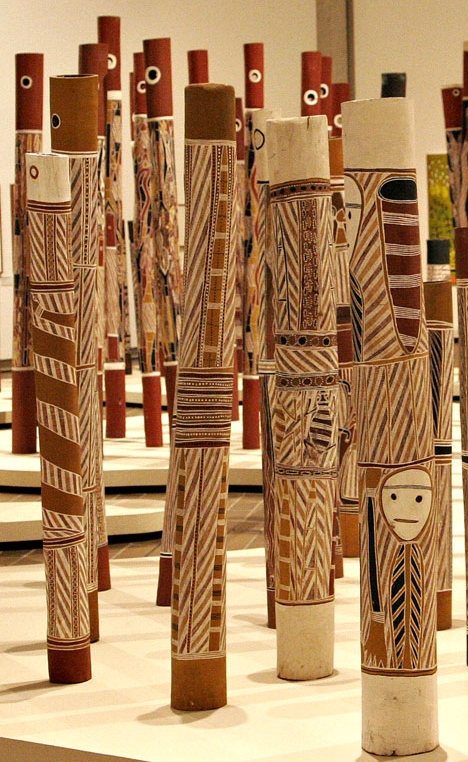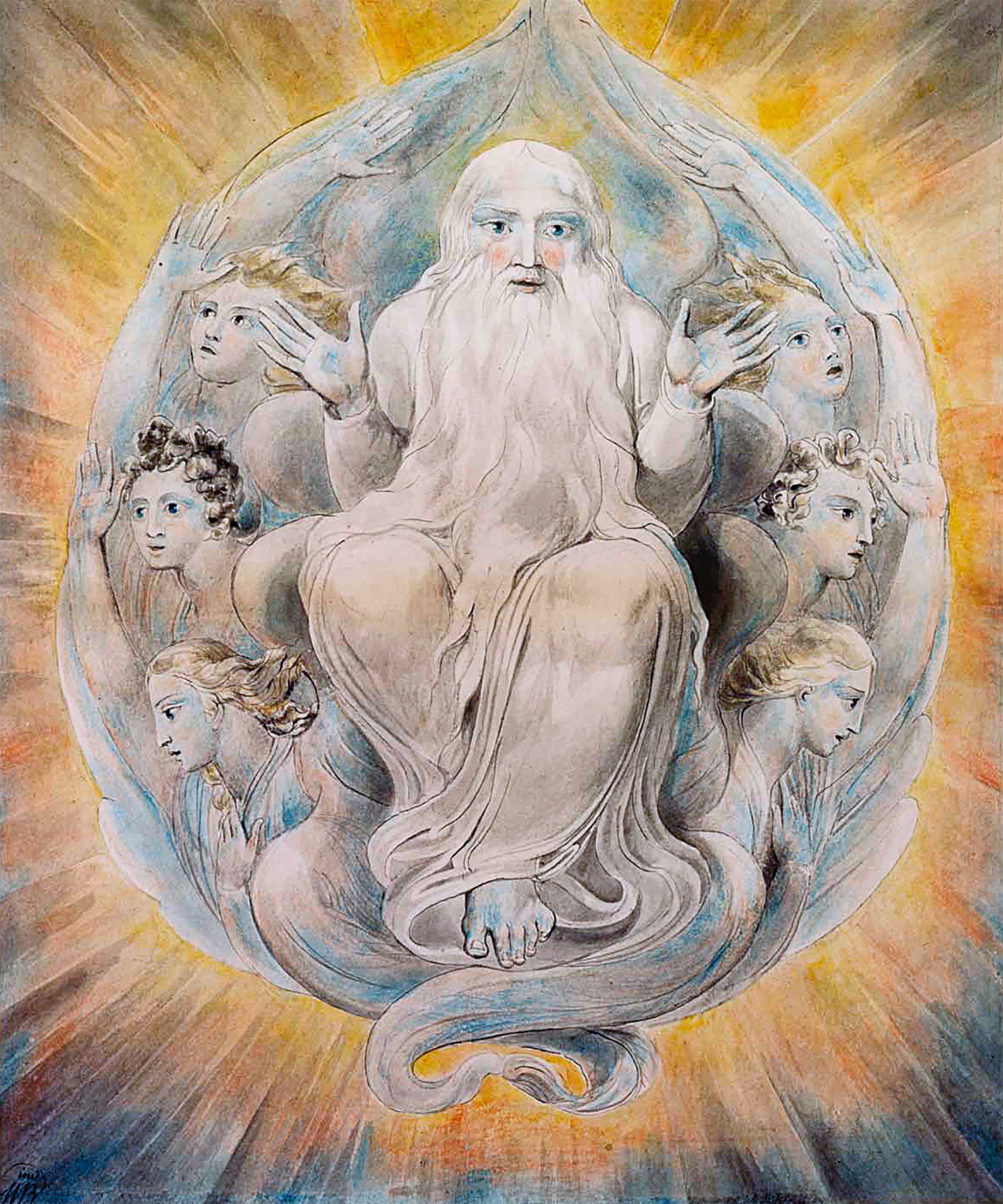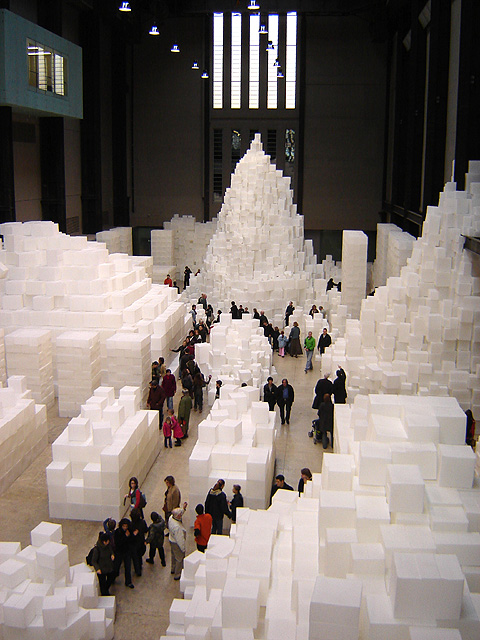|
Larrakitj
A memorial pole, also known as hollow log coffin, burial pole, lorrkkon, ḻarrakitj, or ḏupun, is a hollow tree trunk decorated with elaborate designs, made by the Yolngu and Bininj peoples of Arnhem Land in the Northern Territory of Australia. Originally used to hold the bones of deceased people or for burial ceremonies, they are now made as works of art. The permanent exhibit at the National Gallery of Australia, '' Aboriginal Memorial'', consists of 200 hollow log coffins, created by 43 artists. Terminology The poles are variously known as lorrkkon (in West Arnhem Land, Bininj Kunwok), ḻarrakitj (in the east), or ḏupun by the Yolngu people. The names derive from the name of the burial ceremony, also variously called djalumbu, badurru, mudukundja, mululu and larajeje. English names include hollow log coffins, burial pole, and memorial pole. Description and uses Hollow log coffins vary in size: those made for a burial ceremony are large, while smaller logs may ho ... [...More Info...] [...Related Items...] OR: [Wikipedia] [Google] [Baidu] |
Yolngu People
The Yolngu or Yolŋu ( or ) are an aggregation of Aboriginal Australian people inhabiting north-eastern Arnhem Land in the Northern Territory of Australia. ''Yolngu'' means "person" in the Yolŋu languages. The terms Murngin, Wulamba, Yalnumata, Murrgin and Yulangor were formerly used by some anthropologists for the Yolngu. All Yolngu clans are affiliated with either the Dhuwa (also spelt Dua) or the Yirritja moiety. Prominent Dhuwa clans include the Rirratjiŋu and Gälpu clans of the Dangu people, while the Gumatj clan is the most prominent in the Yirritja moiety. Name The ethnonym Murrgin gained currency after its extensive use in a book by the American anthropologist W. Lloyd Warner, whose study of the Yolngu, ''A Black Civilization: a Social Study of an Australian Tribe'' (1937) quickly assumed the status of an ethnographical classic, considered by R. Lauriston Sharp the "first adequately rounded out descriptive picture of an Australian Aboriginal community." Norman ... [...More Info...] [...Related Items...] OR: [Wikipedia] [Google] [Baidu] |
Buku-Larrnggay
The Buku-Larrnggay Mulka Centre, formerly Buku-Larrŋgay Arts and also known as the Buku-Larrnggay Mulka Art Centre and Museum, is an art centre in Yirrkala, Arnhem Land, in the Northern Territory of Australia. It is often referred to as Buku for short. It is one of many Indigenous art centres across Australia, which support their communities and make them self-reliant – an Australian invention. Many notable artists have worked or continue to work at the centre. The centre also has a stage, named after artist and Indigenous rights activist Roy Marika (c.1925 – 1993), which is used for the annual Yarrapay Festival. History The art of the Yirrkala area has developed a growing market ever since the township was founded as a mission by the Methodist Overseas Mission in 1935, and started selling local artworks. Evidence suggests that Yirrkala art played a major role in the appreciation of Indigenous art by non-Indigenous people. The inspiration for the gallery arose in the ... [...More Info...] [...Related Items...] OR: [Wikipedia] [Google] [Baidu] |
Aboriginal Hollow Log Tombs02 Detail
Aborigine, aborigine or aboriginal may refer to: *Aborigines (mythology), the oldest inhabitants of central Italy in Roman mythology * Indigenous peoples, general term for ethnic groups who are the earliest known inhabitants of an area *One of several groups of indigenous peoples, see List of indigenous peoples, including: **Aboriginal Australians ("Aborigine" is an archaic term that is often considered offensive) **Indigenous peoples in Canada, also known as Aboriginal Canadians **Orang Asli or Malayan aborigines **Taiwanese indigenous peoples, formerly known as Taiwanese aborigines See also * * *'' ab-Original: Journal of Indigenous Studies and First Nations and First Peoples' Cultures'' *Australian Aboriginal identity *Australian Aboriginal English *Aboriginal English in Canada *First Nations (other) First nations are indigenous settlers or bands. First Nations, first nations, or first peoples may also refer to: Indigenous groups *List of Indigenous peoples *First ... [...More Info...] [...Related Items...] OR: [Wikipedia] [Google] [Baidu] |
Creator Being
A creator deity or creator god is a deity responsible for the creation of the Earth, world, and universe in human religion and mythology. In monotheism, the single God is often also the creator. A number of monolatristic traditions separate a secondary creator from a primary transcendent being, identified as a primary creator.(2004) Sacred Books of the Hindus Volume 22 Part 2: Pt. 2, p. 67, R.B. Vidyarnava, Rai Bahadur Srisa Chandra Vidyarnava Monotheism Atenism Initiated by Pharaoh Akhenaten and Queen Nefertiti around 1330 BCE, during the New Kingdom period in ancient Egyptian history. They built an entirely new capital city ( Akhetaten) for themselves and worshippers of their sole creator god in a wilderness. His father used to worship Aten alongside other gods of their polytheistic religion. Aten, for a long time before his father's time, was revered as a god among the many gods and goddesses in Egypt. Atenism was countermanded by later pharaoh Tutankhamun, as chron ... [...More Info...] [...Related Items...] OR: [Wikipedia] [Google] [Baidu] |
Indigenous Australians
Indigenous Australians are people with familial heritage from, or recognised membership of, the various ethnic groups living within the territory of contemporary Australia prior to History of Australia (1788–1850), British colonisation. They consist of two distinct groups, which include many ethnic groups: the Aboriginal Australians of the mainland and many islands, including Aboriginal Tasmanians, Tasmania, and the Torres Strait Islanders of the seas between Queensland and Papua New Guinea, located in Melanesia. 812,728 people Aboriginality, self-identified as being of Aboriginal and/or Torres Strait Islander origin in the 2021 Australian Census, representing 3.2% of the total population of Australia. Of these Indigenous Australians, 91.4% identified as Aboriginal, 4.2% identified as Torres Strait Islander, and 4.4% identified with both groups. The term Aboriginal and Torres Strait Islander peoples or the person's specific cultural group, is often preferred, though the term ... [...More Info...] [...Related Items...] OR: [Wikipedia] [Google] [Baidu] |
Art Installation
Installation art is an artistic genre of three-dimensional works that are often site-specific and designed to transform the perception of a space. Generally, the term is applied to interior spaces, whereas exterior interventions are often called public art, land art or art intervention; however, the boundaries between these terms overlap. History Installation art can be either temporary or permanent. Installation artworks have been constructed in exhibition spaces such as museums and galleries, as well as public and private spaces. The genre incorporates a broad range of everyday and natural materials, which are often chosen for their " evocative" qualities, as well as new media such as video, sound, performance, immersive virtual reality and the internet. Many installations are site-specific in that they are designed to exist only in the space for which they were created, appealing to qualities evident in a three-dimensional immersive medium. Artistic collectives such as ... [...More Info...] [...Related Items...] OR: [Wikipedia] [Google] [Baidu] |
Canberra
Canberra ( ; ) is the capital city of Australia. Founded following the Federation of Australia, federation of the colonies of Australia as the seat of government for the new nation, it is Australia's list of cities in Australia, largest inland city, and the list of cities in Australia by population, eighth-largest Australian city by population. The city is located at the northern end of the Australian Capital Territory at the northern tip of the Australian Alps, the country's highest mountain range. Canberra's estimated population was 473,855. The area chosen for the capital had been inhabited by Aboriginal Australians for up to 21,000 years, by groups including the Ngunnawal and Ngambri. history of Australia (1788–1850), European settlement commenced in the first half of the 19th century, as evidenced by surviving landmarks such as St John the Baptist Church, Reid, St John's Anglican Church and Blundells Cottage. On 1 January 1901, federation of the colonies of Australi ... [...More Info...] [...Related Items...] OR: [Wikipedia] [Google] [Baidu] |
Aboriginal Australian Kinship
Aboriginal Australian kinship comprises the systems of Aboriginal customary law governing social interaction relating to kinship in traditional Aboriginal cultures. It is an integral part of the culture of every Aboriginal group across Australia, and particularly important with regard to marriages between Aboriginal people. The subsection system Subsection systems are a unique social structure that divide all of Australian Aboriginal society into a number of groups, each of which combines particular sets of kin. In Central Australian Aboriginal English vernacular, subsections are widely known as "skins". Each subsection is given a name that can be used to refer to individual members of that group. Skin is passed down by a person's parents to their children. The name of the groups can vary. There are systems with two such groupings (these are known as ' moieties' in kinship studies), systems with four (sections), six and eight (subsection systems). Some language groups extend ... [...More Info...] [...Related Items...] OR: [Wikipedia] [Google] [Baidu] |
Clan
A clan is a group of people united by actual or perceived kinship and descent. Even if lineage details are unknown, a clan may claim descent from a founding member or apical ancestor who serves as a symbol of the clan's unity. Many societies' exogamy rules are on a clan basis, where all members of one's own clan, or the clans of both parents or even grandparents, are excluded from marriage as incest. Clans preceded more centralized forms of community organization and government, and have existed in every country. Members may identify with a coat of arms or other symbol. Etymology The word "clan" is derived from the Gaelic word meaning "children", "offspring", "progeny" or "descendants". According to the ''Oxford English Dictionary'', the word "clan" was introduced into English in around 1406, as a descriptive label for the organization of society in Ireland and the Scottish Highlands. None of the Irish and Scottish Gaelic terms for kinship groups is cognate to English ... [...More Info...] [...Related Items...] OR: [Wikipedia] [Google] [Baidu] |
Aboriginal Memorial June 2022
Aborigine, aborigine or aboriginal may refer to: *Aborigines (mythology), the oldest inhabitants of central Italy in Roman mythology * Indigenous peoples, general term for ethnic groups who are the earliest known inhabitants of an area *One of several groups of indigenous peoples, see List of indigenous peoples, including: **Aboriginal Australians ("Aborigine" is an archaic term that is often considered offensive) **Indigenous peoples in Canada, also known as Aboriginal Canadians **Orang Asli or Malayan aborigines **Taiwanese indigenous peoples, formerly known as Taiwanese aborigines See also * * *'' ab-Original: Journal of Indigenous Studies and First Nations and First Peoples' Cultures'' *Australian Aboriginal identity *Australian Aboriginal English *Aboriginal English in Canada *First Nations (other) First nations are indigenous settlers or bands. First Nations, first nations, or first peoples may also refer to: Indigenous groups *List of Indigenous peoples *First ... [...More Info...] [...Related Items...] OR: [Wikipedia] [Google] [Baidu] |
Australian Aboriginal Elder
Australian Aboriginal elders are highly respected people within Australia and their respective Aboriginal and Torres Strait Islander communities. An elder has been defined as "someone who has gained recognition as a custodian of knowledge and lore, and who has permission to disclose knowledge and beliefs". They may be male or female, and of any age, but must be trusted and respected by their community for their wisdom, cultural knowledge and community service. Elders provide support for their communities in the form of guidance, counselling and knowledge, which help tackle problems of health, education, unemployment and racism, particularly for younger people. They may be distinguished as one of two types: community elders and traditional elders. Elders play an important role in maintenance of culture, songs, oral histories, sacred stories, Aboriginal Australian languages, and dance, and are also educators who demonstrate leadership and skills in resolving conflicts. Elders al ... [...More Info...] [...Related Items...] OR: [Wikipedia] [Google] [Baidu] |
Australian Design Review
Australian(s) may refer to: Australia * Australia, a country * Australians, citizens of the Commonwealth of Australia ** European Australians ** Anglo-Celtic Australians, Australians descended principally from British colonists ** Aboriginal Australians, indigenous peoples of Australia as identified and defined within Australian law * Australia (continent) ** Indigenous Australians * Australian English, the dialect of the English language spoken in Australia * Australian Aboriginal languages * ''The Australian'', a newspaper * Australiana, things of Australian origins Other uses * Australian (horse), a racehorse * Australian, British Columbia, an unincorporated community in Canada See also * The Australian (other) * Australia (other) * * * Austrian (other) Austrian may refer to: * Austrians, someone from Austria or of Austrian descent ** Someone who is considered an Austrian citizen * Austrian German dialect * Something associated with the countr ... [...More Info...] [...Related Items...] OR: [Wikipedia] [Google] [Baidu] |






